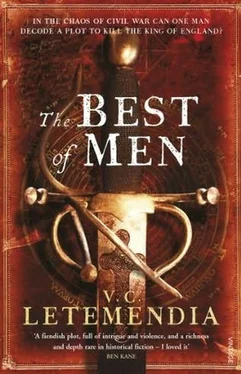Claire Letemendia - The Best of Men
Здесь есть возможность читать онлайн «Claire Letemendia - The Best of Men» весь текст электронной книги совершенно бесплатно (целиком полную версию без сокращений). В некоторых случаях можно слушать аудио, скачать через торрент в формате fb2 и присутствует краткое содержание. Год выпуска: 2009, ISBN: 2009, Издательство: McClelland & Stewart, Жанр: Исторические приключения, на английском языке. Описание произведения, (предисловие) а так же отзывы посетителей доступны на портале библиотеки ЛибКат.
- Название:The Best of Men
- Автор:
- Издательство:McClelland & Stewart
- Жанр:
- Год:2009
- ISBN:978-0-7710-5274-3
- Рейтинг книги:5 / 5. Голосов: 1
-
Избранное:Добавить в избранное
- Отзывы:
-
Ваша оценка:
- 100
- 1
- 2
- 3
- 4
- 5
The Best of Men: краткое содержание, описание и аннотация
Предлагаем к чтению аннотацию, описание, краткое содержание или предисловие (зависит от того, что написал сам автор книги «The Best of Men»). Если вы не нашли необходимую информацию о книге — напишите в комментариях, мы постараемся отыскать её.
The Best of Men — читать онлайн бесплатно полную книгу (весь текст) целиком
Ниже представлен текст книги, разбитый по страницам. Система сохранения места последней прочитанной страницы, позволяет с удобством читать онлайн бесплатно книгу «The Best of Men», без необходимости каждый раз заново искать на чём Вы остановились. Поставьте закладку, и сможете в любой момент перейти на страницу, на которой закончили чтение.
Интервал:
Закладка:
A most extraordinary woman emerged from the shadows: she was an African, her skin not black but a ruddy copper hue. She wore indigo robes, with a cloth of the same colour wound about her temples, and her ears were pierced with gold rings from the top to the bottom of both lobes. Her hair was dressed in tiny plaits, sticking out from beneath the cloth like so many spiders’ legs. At the corner of each eye there were three short scars, as though to simulate the lines of a smiling person, and her nose was long and fine, like José’s. Her age could have been anywhere between thirty and fifty years old. José addressed her in what Laurence recognised as Arabic, and she went away, head held high as if she were a princess rather than the slave that he presumed she was.
“Khadija will bring us fresh linen and make food while we perform our ablutions,” José told him.
In a separate room off the courtyard was the bath, wide and deep, like a rectangular pond, filled with scented water. José paused once more, regarding Laurence intently as if to gauge his reaction, and then began to undress. Laurence held back, embarrassed by the layers of grime beneath his clothes; he had not been able to wash properly more than once or twice in the past few months.
“What is it, sir?” José inquired, as he sank into the water. “Are you not accustomed to bathing? Or is it that you have never seen a circumcised man?” he added, in a low voice.
“But I have. I knew a Jew in The Hague.”
José considered this carefully. “Could he practise his faith, where he was?”
“I believe so. I hope so, at any rate.”
Again, José appeared surprised. “But you are a Christian, no?”
“I am … nothing,” Laurence said, as he bent to rinse the thief’s blood from his hands.
“You are not nothing in the eyes of God. Remember that. I shall be frank with you, sir,” José continued. “My birth name is not José. It is Yusuf.”
“Were you a Muslim?”
“I still am.” There was a silence. “Do you regret now that you saved me?” asked Yusuf.
“Not at all — though isn’t it forbidden for you to worship?”
“It is forbidden these days even to have infidel ancestry. As you may know, more than thirty years ago the conversos were almost all expelled, and amongst those of us left, few are brave enough to cling to our true religion. I could bring the Inquisition down upon me just for taking this bath.”
So Yusuf had risked his own life, Laurence realised, in inviting him here.
After they had dried themselves, Yusuf gave Laurence a clean shirt. “My son’s,” he said. “He is away doing business on the Guinea Coast, where I bought my Khadija. She is now the lady of the house. My first wife died when I was still captain of a ship. I have five sons who are grown and gone to sea — they inherited my passion for it.”
At table they were served by Khadija. Yusuf took no wine himself but filled Laurence’s cup generously. When the plates were cleared, he brought out a pipe and lit it. After inhaling, he passed it to Laurence, who was familiar with the smell: he had smoked hashish as a youth with his tutor Seward in Venice, and on a few occasions since. Relaxed by the drug, he listened more than he talked, yet he began to suspect, from something in Yusuf’s manner, that his host was deliberating over an unspoken question.
Finally Yusuf put down the pipe. “I must ask — why do you claim to be an Englishman? I am sure that you have Barbary blood. I should call you a Moor like myself, if it would not insult you.”
“Oh no, I’m used to being called many things,” said Laurence, amused. “I’m only half English, though. My mother is a Spaniard.”
“Ah, that explains your facility with the language. Is she in Cadiz?”
“She’s in England. I haven’t seen her in six years.”
“You have been away a while. As a soldier?”
“For most of the time.”
“So what brings you to my city?”
Laurence laughed shortly. “No good reason.”
“Are you by yourself?”
“Yes.”
“Where will you go next?” Laurence shrugged. “You are welcome to stay with me however long you wish,” Yusuf said, “or I could find you passage to Africa, or to the Indies, should that strike your fancy. There is also a ship in harbour bound for the English coast. She leaves within the week. Or would you prefer to travel by land?” Laurence shrugged again; he had absolutely no answer. “Khadija!” cried Yusuf. “Our guest is in need of advice.”
Khadija came bearing a small woven basket. She tipped it on to the table and about a dozen small, shiny, oval-shaped shells fell out, smooth on one side and etched with what resembled little teeth on the other. “Pick them up and put them in my hands,” she told Laurence, in accented Spanish. “Then I shall let them fall where they will, and read them for you. They will speak of your future.”
“I’m sorry, but I don’t believe they can,” Laurence said, forcing a smile.
“Then what have you to worry about?” asked Yusuf.
It would be churlish to decline, so Laurence did as she bade. He must pretend interest, he reminded himself, as she surveyed the shells, her broad lips parted in concentration.
“You tried to kill yourself today,” she began, her tone clear and certain.
Laurence betrayed no reaction. Privately, he was unsettled. Even if his host had described to her what had happened on the road to Cadiz, there was an earlier event about which Yusuf could not be aware.
“A woman has poisoned you,” she went on, sending a shiver down his spine. “Now you are in hiding, from the world and from yourself. Yet soon you will cross paths with another woman, who will deserve your love. She has the name of a great queen and she will give birth to your child, if you are ready for her. But if you do not spit out the poison, you will lose her.”
His scepticism returned: it was the sort of vague, trite prophecy that Juana might have invented, assuming that everyone wanted to hear about love and fertility. In his case, this could not be further from the truth. The strange apprehension that he had just felt was probably the hashish working on his troubled mind.
“Again,” Khadija ordered. Obediently he gathered up the shells. This time when she released them they jumped apart and scattered as though possessed of their own force. She absorbed their arrangement and said with the same certainty, “You alone can prevent a tragedy in your land, and what you have that was stolen holds the key.”
“What is it that I have?” Laurence demanded, his pulse quickening. “Can you tell me?”
Khadija made no sign that she had heard, putting the shells back in their basket one by one. She was too astute to spoil the impact of her guesswork by elaborating on it, he thought wryly. Remarkable, however, that she should have been quite so fortunate.
She gestured to him to give her his hands; hers were soft, her fingers slender and pliable as those of a girl. Was he meant to thank her, he wondered, or was she offering him some kind of blessing? Her expression at once tender and severe, she inspected his palms, calloused from riding, and his nails, broken from months of living rough; and she rolled up his sleeves to the elbow, palpating the lean flesh of his forearms with her fingertips. “You earn your way with your hands,” she commented.
“He is a soldier, Khadija,” Yusuf informed her.
“Not any more. He makes his living through games of chance.” Laurence blinked at her, astonished. “And the night this was done to you,” she said, touching the scar on his left wrist, “you played a game that changed your fate.” He gasped, shuddering as she caressed it.
“Khadija, now you are scaring him,” said Yusuf. “He’ll think you are a witch.”
Читать дальшеИнтервал:
Закладка:
Похожие книги на «The Best of Men»
Представляем Вашему вниманию похожие книги на «The Best of Men» списком для выбора. Мы отобрали схожую по названию и смыслу литературу в надежде предоставить читателям больше вариантов отыскать новые, интересные, ещё непрочитанные произведения.
Обсуждение, отзывы о книге «The Best of Men» и просто собственные мнения читателей. Оставьте ваши комментарии, напишите, что Вы думаете о произведении, его смысле или главных героях. Укажите что конкретно понравилось, а что нет, и почему Вы так считаете.












